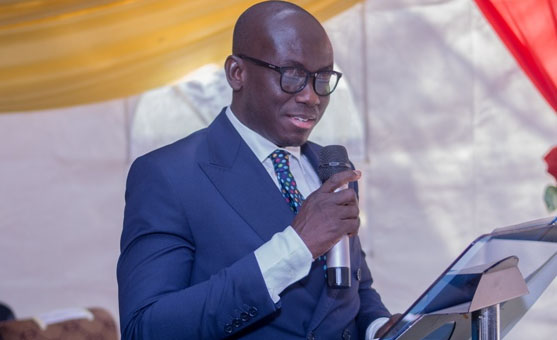Godfred Yeboah Dame
The Attorney General and Minister for Justice, Godfred Yeboah Dame, has stated categorically that there is no judgment debt against the government in the Heritage Imperial Limited case that was filed against the state.
According to him, the judgment entered by the Kumasi High Court over a year ago ordered payment of $15,304,714.20 to the plaintiff company in the suit No. C1/34/2019 has been set aside by the same court on July 30, 2021 after the Attorney General challenged the ruling.
Answering questions on the floor of Parliament yesterday, Mr. Dame also dismissed the existence of “arbitral award of $15m against the state, stressing that “there has never been such an arbitral award. There is also no award of the sum of $15m as judgment debt in any dispute between Heritage Imperial Limited and the state, in action filed in court.”
NDC MP for North Tongu, Samuel Okudzeto Ablakwa, on behalf of his colleague, Rockson-Nelson Etse Kwame Dafeamekpor (NDC South Dayi), had asked the Attorney General what circumstances led to the arbitral award of $15 million against the nation in the case of Heritage Imperial Limited vs. the Ministry of Lands and Natural Resources & Attorney General.
“I understand an appeal has been filed by the company but the effect remains that there is no judgment against the state. At the time, the question was filed, Mr. Speaker, there was no judgment debt against the state,” he explained.
Case Facts
Mr. Dame narrated that sometime, in 2017, the government in an attempt to tackle the menace of illegal mining, set up an Inter-Ministerial Committee on Illegal Mining.
“To enforce its mandate, the committee was assisted by a taskforce made up of members of the security forces and Environment Protection Agency (EPA) officials.”
According to him, on December 6, 2018, the Inter-Ministerial Committee on Illegal Mining went to Heritage Imperial Company’s mining concession and seized its equipment, machinery and monies on suspicion of engaging in illegal mining.
The minister recounted that the company on February 20, 2019, instituted an action and sought reliefs, which included “endorsed on its writ of summons: Declaration that the invasion of the plaintiff’s mining site and the seizure of its excavators and equipment is unlawful.”
He indicated that the company also sought an order directed at the defendants (state) to release the plaintiff’s machinery, equipment and monies seized by the Taskforce of the Inter-Ministerial Committee on Illegal Mining from its concession.
The Attorney General (AG) said the company, in the alternative, wanted the cost of the machinery and equipment to be assessed and the value paid to it by the state, and recovery of the sum of $15,304,714.20 being the value of machinery and equipment seized from the site among others.
He said the matter was handled by the Office of Attorney General in Kumasi, Ashanti Region, from February 2019 until judgment was delivered in July, 2020.
“In my former capacity as Deputy Attorney General, I was neither aware of the pendency of the suit nor responsible for the conduct of the same, as the conduct of the suit was not part of the cases assigned to me,” he indicated.
The minister, however, said on assuming office as Attorney General, he got to know about the entry of judgment against the state in or about July, 2021, when it was being discussed on a radio programme.
“I inquired about the existence of the judgment, factors accounting for its entry and set out to ascertain means of upsetting or overturning the judgment against the state.
“I observed that the institution of the case and its prosecution were fraught with serious and fundamental statutory infractions, which, in my respectful view, vitiated the judgment. Unfortunately, the time for filing an appeal had long elapsed. The right of an appeal to the state was non-existent,” he told the MPs.
He continued that he formed the view that in spite of the lapse of over one year since judgment had been entered, the inherent jurisdiction of the High Court itself could be invoked to consider the gross fundamental issues affecting the jurisdiction of the court over the conduct of the action.
“On July 13, 2021, I invoked the inherent jurisdiction of the High Court for an order setting aside the judgment which had been entered in July, 2020,” he pointed out.
Grounds for the Challenge
“Our contention was that the commencement of the action by plaintiff without regard to the mandatory statutory stipulations of the State Proceedings Act, 1998 (Act 555), was unlawful,” he stated.
The AG said that the order for payment by the government of the sum of $15,304,714.20 was manifestly unlawful and without basis, as no endorsement on the writ of summons issued in the action supported the order.
“The rules of court require a writ of summons to be endorsed with a concise statement of the nature of the claim made, or the relief or remedy required in the action. However, in no part of either the writ of summons or the pleadings of the respondent did the respondent claim the sum of US$15,304,714.20 against the applicant herein. The Court thus did not have jurisdiction to grant the relief of US$15,304,714.20,” he indicated.
He explained further that the failure of the plaintiff to claim the relief of US$15,304,714.20 on its writ of summons was clearly intended to deceive the court and avoid the payment of appropriate filing fees.
“The act of the plaintiff in concealing the specific cost of the equipment it alleged to have acquired, was one calculated at overreaching not only the Court but also the Government of Ghana, and therefore ought not to be rewarded by a court of law and equity,” he said.
By Ernest Kofi Adu, Parliament House


